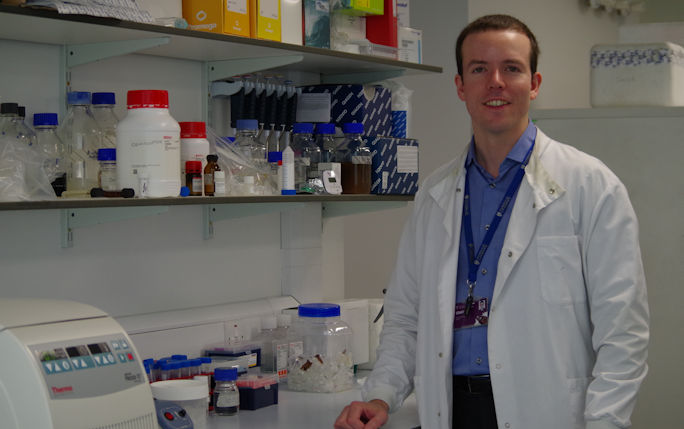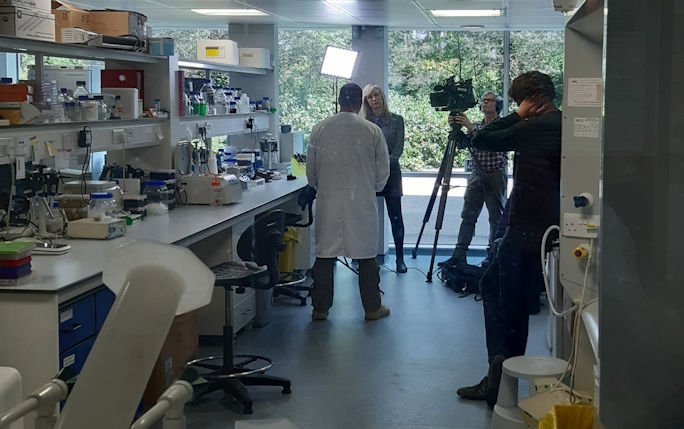Adapting to the unprecedented challenge of COVID-19

Liverpool Veterinary Parasitology Diagnostics (LVPD) is a specialist diagnostic service based at the Institute of Infection, Veterinary and Ecological Sciences. LVPD offers laboratory tests for UK endemic and exotic veterinary parasitic diseases to support veterinary patient care, education, surveillance and research. Here, Paul Gilmore (Technical Lead in Diagnostic Veterinary Parasitology) reflects on their work during the extraordinary year of 2020.
I watched with intrigue and increasing concern as news of the SARS-CoV-2 outbreak developed throughout January. Despite our work initially continuing as normal; as the weeks went by and as the effect of its spread progressively encroached on all our lives, it became increasingly apparent that significant change was inevitable.
However, even with this looming sense of anticipation, the pace and scale of change, as events unfolded in the week of the 16 March, was not only astonishing, but deeply, deeply disconcerting. Despite being well aware of disease outbreaks (from working in a department with major research programmes into serious infectious agents such as Ebola) and having studied Medical Microbiology at university, I never thought I would live to witness the emergence of a pandemic.
The onset of the first UK national lockdown led to the immediate cessation of all non-COVID activities on campus at the University of Liverpool, meaning we had to place the diagnostic service on ice. In a short space of time, I had to wrap up my case load and notify our client base before being redeployed as a key worker.
Life as a key worker
My new role was to support COVID-19 research projects within the Department of Infection Biology and Microbiomes led by Professor Julian Hiscox, using whole virus genome sequencing of positive patient samples, as part of the University’s broad and intensive response to COVID-19. This work formed an integral part of the COVID-19 Genomics UK Consortium, which studies the epidemiology and evolution of SARS-CoV-2, in order to positively affect clinical outcomes in both the current pandemic and future potential outbreaks. Sequencing was performed using MinION and GridION devices from Oxford Nanopore Technologies.

Pictured above: Professor Julian Hiscox being interviewed by BBC Newsnight
Driving to and from work on deserted roads was eerie and the days were demanding, but I felt shielded in our bubble, and the focussed nature of the work, served to buffer against the backdrop of an increasingly upsetting news cycle. It felt humbling to be part of these efforts at a time of national crisis but equally, I also felt a sobering sense of responsibility regarding the task at hand.
Whether it was maintaining our liquid nitrogen cryo-stores, calibrating pipettes, dealing with TV broadcast journalists or participating in the genome sequencing pipeline; from the mundane to the complex, my outlook was the same throughout – “whatever we need, I’ll do it”. It was inspiring to witness our society come together in such broad solidarity during the first lockdown, and the admirable efforts of brave healthcare workers, certainly sought to spur me on.
We conducted two main studies during this time: Amplicon-Based Detection and Sequencing of SARS-CoV-2 in Nasopharyngeal Swabs from Patients With COVID-19 and Identification of Deletions in the Viral Genome That Encode Proteins Involved in Interferon Antagonism and Tissue-specific Immunopathology in Fatal COVID-19. These and many other studies are a testament to the dedication, expertise and professionalism of everyone involved at the University and I am proud to have been part of these collective efforts.
Adapting to a “new normal” – but continuing our valuable diagnostics and research
As the University transitioned to resumption of non-COVID lab work over the summer, we were able to reopen the service, with three days on campus and two days working from home. This presented its own challenges but thankfully, we have been able to serve our clients once more, resume our research project activities and hopefully we can transition back to full-time on campus work in 2021.
Upon reopening, we completed our collaboration with Dr Peers Davies Reader in Livestock Health and Welfare and Laura Taylor PhD student investigating 41 farms in Wales for prevalence of Fasciola hepatica and Calicophoron daubneyi. This work formed part of the study ‘Management of iceberg diseases and nutritional status in Welsh sheep flocks to maximise lamb output’, which is a collaboration between the University of Liverpool, Hybu Cig Cymru and University of Edinburgh; and will be included in Laura’s PhD thesis.
In other work, we published the First report of Lyme borreliosis leading to cardiac bradydysrhythmia in two cats. This was a collaboration with colleagues from the Small Animal Teaching Hospital and the University of Edinburgh.
We are also continuing to work closely with The Famer Network and Yorkshire Agriculture Society to support the management of Fasciola hepatica in Cumbrian sheep flocks, in accordance to the Liverpool Fluke Plan, for the 2020/21 season.
Lastly, we are continuing our collaboration on a European Innovation Project to revise worming protocols for replacement heifer calves on three dairy farms in Wales. The project is led by the company Techion, who produce FecPakG2, an online faecal egg counting system. So far results show that Group 3 (Clear) wormers appear to be less effective than expected, suggesting possible resistance. Linking with Professor John Gilleard (BVSc 1986) at University of Calgary, we have shown that both Ostertagia spp. and Cooperia spp. were present before treatment, but that the majority of the worm population that survived treatment was Cooperia spp.
The primary role of LVPD is to provide veterinary parasitology diagnostics to the University of Liverpool’s veterinary teaching hospitals, first opinion practices, farms and pathology service, and to support the delivery of the BVSc programme. By choosing to use LVPD for your parasitology diagnostics you will be supporting the training of the veterinary surgeons of the future.
For further information on LVPD and the services available, visit their website here.